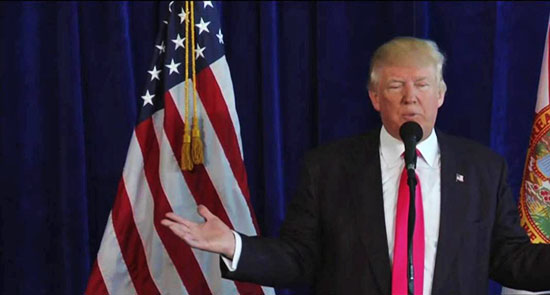|
by Bernhard
Not-Hillary because putting up Hillary as candidate was the most stupid thing the Democratic party and it paymasters could do. She had extremely high negative ratings and stood for everything that one could dislike with the party's policies.
Many who ended up not
voting or voted for Trump could have been easily won by a different
Democratic candidate even with much of the same general policies
(see:
Obama, Barack).
History will note that she was an arrogant but incompetent Democratic candidate who lost against a rather bad Republican candidate, one who lacked support even from his own party.
Trump won barely, but she
lost completely...
Here is an interesting take based on a theory from the 1950s:
The 2016 US election, like all other US elections, featured a gallery of pre-selected candidates that represented the three factions and their interests within the power elite.
The 2016 US election, however, was vastly different from previous elections.
As the election dragged
on the power elite became bitterly divided, with the majority
supporting Hillary Clinton, the candidate pre-selected by the
political and corporate factions, while the military faction rallied
around their choice of
Donald Trump.
The corporate factions are divided within.
The decisive political point in this election round was the fight between neo-conservatives/liberal-interventionists and foreign policy realists.
One side is represented
exemplary by
the CIA with the U.S. military on
the other:
The Generals do not like that (the precedence of al-Qaeda in Afghanistan was enough for them.) Neither does the military industry.
Fighting Takfiris does
not require big ticket items. Ratcheting up the rhetoric against
peer competitors (without ever fighting a real war) is the best
justification for a two million strong military and huge military
contracts.
Trump's salesmen bluster proved too fascinating to not be reported. In the end the media that hated him ended up making the very best advertisement for him.
For weeks the neoconned
Washington Post editorial page ran five or six anti-Trump
pieces per day. That alone was for some reason enough to vote for
Trump.
His confrontational position against main exporting countries,
...will also transfer into higher U.S. corporate profits.
It may even create some
additional jobs in the U.S. which would help him to get reelected.
Expect the announcement
of some super nifty, new but useless military wonder weapon for
which Trump will promise trillions (Reagan's star wars redux).
Trump will have to
neutralize or fire people in their upper ranks early and often. If
he fails to do that all his plans will be challenged and stymied in
their early implementation.
His current rhetoric in relations to other countries should be seen as opening shots. Such threats and offers alike are to him just parts of a negotiation process. His main aim with those will be to get some manufacturing back into the United States.
He needs some success in
this, in creating jobs, jobs, jobs and raising wages, to secure his
reelection.
His U.S. centric protectionism will allow other countries to also take steps in such a direction.
At one point Trump will
have to take up a fight with speculative Wall Street banking. It is
an impediment for all his other aims. This will be his most
difficult fight and the one he will probably lose.
His time in the White
House will probably turn out to be minor remake of Reagan's...
|


